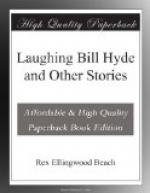Then, one evening, he heard that which froze him in his tracks. The singer accompanied herself upon some instrument the like of which he had never imagined. The music filled the air with heavenly harmony, and it set him to vibrating like a tautened string; it rippled forth, softer than the breeze, more haunting than the perfume of the frangipani. Joseph stood like a man in a trance, forgetful of all things save these honeyed sounds, half minded to believe himself favored by the music of the seraphim.
Never had he dreamed of such an intoxication. And then, as if to intensify his wild exultation, the maiden sang a yearning strain of passion and desire.
The priest began to tremble. His heart-beats quickened, his senses became unbridled; something new and mighty awoke within him, and he was filled with fever. His huge thews tightened, his muscles swelled as if for battle, yet miracle of miracles, he was melting like a child in tears! With his breath tugging at his throat, he turned off the path and parted the verdure, going as soundlessly as an animal; and all the while his head was whirling, his eyes took note of nothing. He was drawn as by a thousand invisible strings, which wound him toward the hidden singer.
But suddenly the music ended in a peal of rippling laughter and there came the rustle of silken garments. Fray Joseph found himself in a little open glade, so recently vacated that a faint perfume still lingered to aggravate his nostrils. Beyond stretched the vineyard of the Moor, a tangle of purpling vines into the baffling mazes of which the singer had evidently fled.
So she had known of his presence all along, the monk reflected, dizzily. It followed, therefore, that she must have waited every evening for his coming, and that her songs had been sung for him. An ecstasy swept over him. Regaining the path, he went downward to the monastery, his brain afire, his body tingling.
Joseph was far too simple for self-analysis, and he was too enchanted by those liquid strains to know what all this soul confusion foretold; he merely realized that he had made the most amazing of discoveries, that the music of the spheres had been translated for his privileged ears, that a door had opened allowing him to glimpse a glory hidden from other mortals. It was not the existence of the singer, but of the music, that excited him to adoration. He longed to possess it, to take it with him, and to cherish it like a thing of substance, to worship it in his solitude.
The song had been of love; but, after all, love was the burden of his religion. Love filled the universe, it kept the worlds a-swinging, it was the thing that dominated all nature and made sweet even the rigid life of an anchorite. It was doubtless love which awoke this fierce yet tender yearning in him now, this ecstasy that threatened to smother him. Love was a holy and an impersonal thing, nevertheless it blazed and melted in his every vein, and it made him very human.




